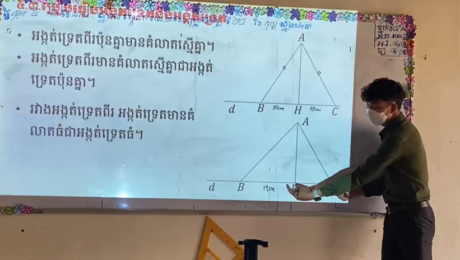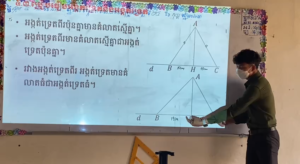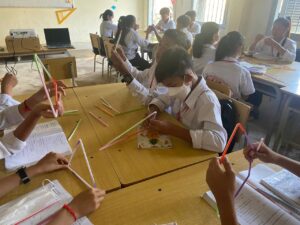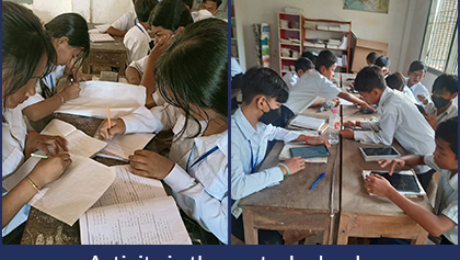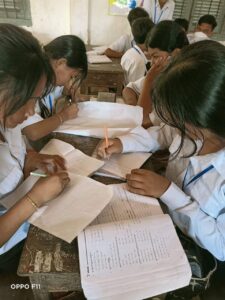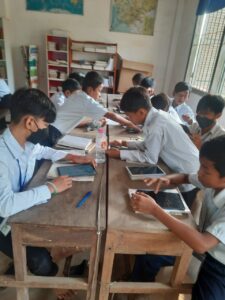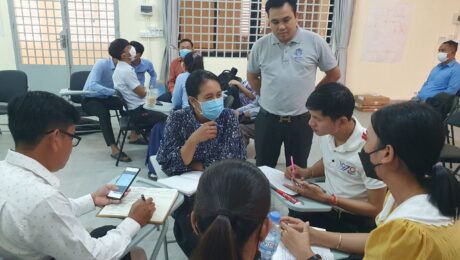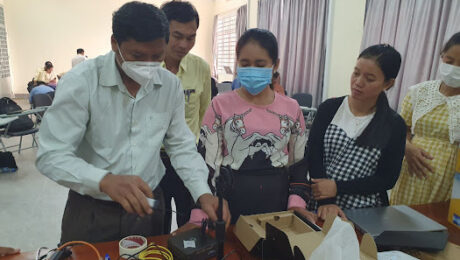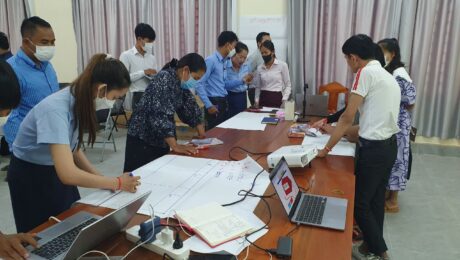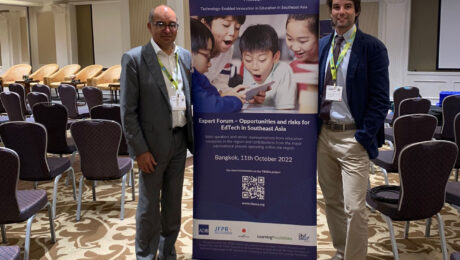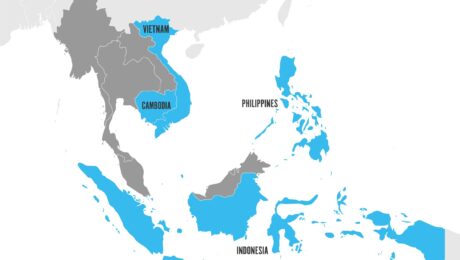Koh Khsach Tunlea Lower Secondary School
|
||||||||
|
- Published in All Reports, Cambodia All Reports, Cambodia Pilot Interventions
Activity in the control schools
|
||||||||||
|
- Published in All Reports, Cambodia All Reports, Cambodia Pilot Interventions
Teaching with technology
Teachers become familiar with the tabs that will be used by their students and experience approaches to teaching effectively with technology.
- Published in Cambodia All Reports, Cambodia Pilot Interventions
Mastering the devices
Teachers learn how to power up the offline content servers, download and upload STEM content. They are also introduced to the tabs and projectors supplied by the project.
- Published in Cambodia All Reports, Cambodia Pilot Interventions
Intensive Pedagogy Training
Our schools in Cambodia have just completed two training workshops with KAPE (Kampuchea Action to Promote Education). Using table computers, projectors and content stored on Koompi offline servers in their science classrooms, teachers are creating activity-based STEM learning environments for their students. Much of the content has been assembled by the Centre for Digital and Distance Education and is in Khmer language.
- Published in Cambodia All Reports, Cambodia Articles, Cambodia News
The TIESEA pilot project in Cambodia is being implemented in three schools
- Koh Khsach Tunlea Lower Secondary School. At this school students in grade 8 will learn from Khmer language STEM eLearning content saved on an offline content server and accessed through a tablet computer. Each student will have the privilege of taking their tab home after school to study further.
- Koh Khel Lower Secondary school. Grade 8 students will learn in the same way but will not be able to take their tabs home with them.
- Anlong Tasek Secondary School. Students will receive no project support but teachers will be invited to participate in teacher training.
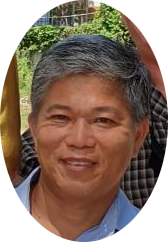 |
|
Kosal Chea |
|
Independent Expert – Cambodia |
- Published in Cambodia All Reports, Cambodia Pilot Interventions
TIESEA EdTech Interventions Proposal
Educational Technology (EdTech) has the power and capacity to significantly enhance teaching and learning for students in all parts of the world. Online, and digitally-enhanced, learning provides a new dimension that offers potentially unlimited opportunities; but, as we learnt during the COVID pandemic, these opportunities are unevenly spread. As a result of school closures, coupled with poor infrastructure, we know that many children in middle-income countries suffered almost two years without access to any form of tuition.
The Technology-Enabled Innovation in Education in South-East Asia (TIESEA) is a two-year multi-country program funded by the Japan Fund for Prosperous and Resilient Asia and the Pacific through the Asian Development Bank (ADB) and implemented by a joint venture between IBF International Consulting and Learning Possibilities. Aimed at piloting EdTech devices both in school and at home for students and teachers at secondary school level in order to assess the extent to which EdTech devices can be used to improve the learning and teaching quality among target students and teachers in the pilot school and community.
The TIESEA project, therefore, has an overriding ambition of proposing EdTech solutions in the four partner countries that are relevant, realistic, scalable, and sustainable; and which serve to bridge rather than deepen the digital divide. A common feature across all the country profiles is weak, unreliable, and uneven access to internet connectivity, especially in non-urban locations, and poor availability of EdTech devices for students.
Accordingly, in most interventions, at least part of the proposed solution is through providing rich and comprehensive learning resources through content-rich “internet in a box” with local distribution networks for universal access, where there is poor internet access. In most proposed cases the student devices are low-cost and durable tablets and cellphone handsets.
Through trialing the proposals in some of the most challenging environments, the hope of the project team is that there will good demonstrations of how technology-enhanced learning can be promoted and experienced by learners in all conditions. In this way, the TA team aims to show how scalability can be achieved through innovative technology applications and sustainable funding mechanisms that involve the private sector.
The country-level eReadiness assessments already conducted by the in-country experts of the TIESEA Technical Assistance (TA) team have identified the following national needs:
• In Cambodia, a need to use EdTech effectively to promote STEM and resource-based, student-centered education.
• In Indonesia, a need to find a mechanism through which schools in areas with limited Internet connectivity can join the rest of the country in adopting Kurikulum Merdeka (the recently launched, Freedom to Learn curriculum).
• In the Philippines, a need to find a mechanism through which vocational education can be extended to underserved areas of the country supporting youth in those areas to become skilled and work-ready.
• In Viet Nam, a need to equip students to be able to communicate effectively in English in an increasingly global society.
Read the full intervention here
Opportunities and risks for EdTech in Southeast Asia – (Khmer)
Catch up or re-watch the ‘Opportunities and risks for EdTech in Southeast Asia’ event from Bett Asia, with leading industry experts and senior government leaders.
This recorded session outlines the local situation, country by country, and seeks to demonstrate how the project interventions can overcome obstacles in order to maximise the contribution that EdTech can make to both students’ achievement and the quality of learning in the region.
- Published in Cambodia Workshops, Workshops
Executive Summary – Cambodia (English and Khmer)
Based on the five pillars of the ADB EdTech Readiness Framework, this report describes the current situation of education in Cambodia in general, with a specific focus on how EdTech is being implemented to improve the quality of teaching and learning. The five pillars of the framework include infrastructure, government, schools/teachers, parents/students, and EdTech providers. By identifying the existing status of EdTech readiness in Cambodia using this framework, the report seeks to provide evidence against which decision-makers can identify initiatives likely to make a positive contribution to the quality of the education ecosystem and opportunities for public-private partnerships. Cambodia had a population of 16.83 million people in January 2021 (51.2% of Cambodia’s population is female) and 8.86 million internet users in January 2021, giving it a 52.6% internet penetration rate1 . In 2021 Cambodia had 12.00 million social media users (equal to 71.3% of the population). Cambodia is ranked 106th out of 130 economies in the Network Readiness Index (NRI) 2021, with impact (quality of life) as its key strength and governance as its main weakness (trust). An account of the gender gap in EdTech is included in Annex 3) of this report. In brief its findings are that the Royal Government of Cambodia is committed to gender equality and over the past five years the proportion of women who are in the workforce has increased by 5% to 84%; but female’s opportunities in EdTech are largely limited by cultural and family beliefs and values that see EdTech as being a male dominated field. Notwithstanding this, in Upper Secondary Schools the proportion of girls remaining is education is higher (54%) than boys (46%) and girls are increasingly opting for STEM subjects – though they are then more likely to follow science than technology options at university. More women are now becoming self-employed (65% of all SMEs are now owned and run by women) and their skills in using online eCommerce opportunities is a critical success factor here. In general women teachers have lower EdTech skills than men and lower levels of digital literacy. Although in general, across the country, smartphone ownership is high, rural women are the least likely segment of the population to own a cellphone.
Download the full report
- Published in All Reports, Cambodia All Reports, Cambodia Summary, Summary
Report on Knowledge Sharing and Ideation Country Workshops and Regional Workshop April 2022
The aim of the TIESEA project is to identify what works in Education Technology (EdTech) in the context of the four countries where the project is operating: Cambodia, Indonesia, Philippines, and Viet Nam. Based on a landscape review of existing EdTech in each country and an assessment of supporting infrastructure as well as teacher, student, and parent capacity, a single intervention will be designed for each country. These pilot interventions will run in each of the countries for one year, and the impact on educational attainment and the quality of learning will be rigorously evaluated. The project will also undertake capacity-building workshops and host a major international conference during 2023 to share the findings of the project and to disseminate more widely the strengths and areas for
development in the key interfaces between schools, homes, families, and technology.
Download the full report
Report on Knowledge Sharing and Ideation Country Workshops and Regional Workshop
- 1
- 2
